Wild Bill Hickok died on August 2, 1876, in Deadwood, South Dakota, after he was shot in the back of the head by Jack McCall.
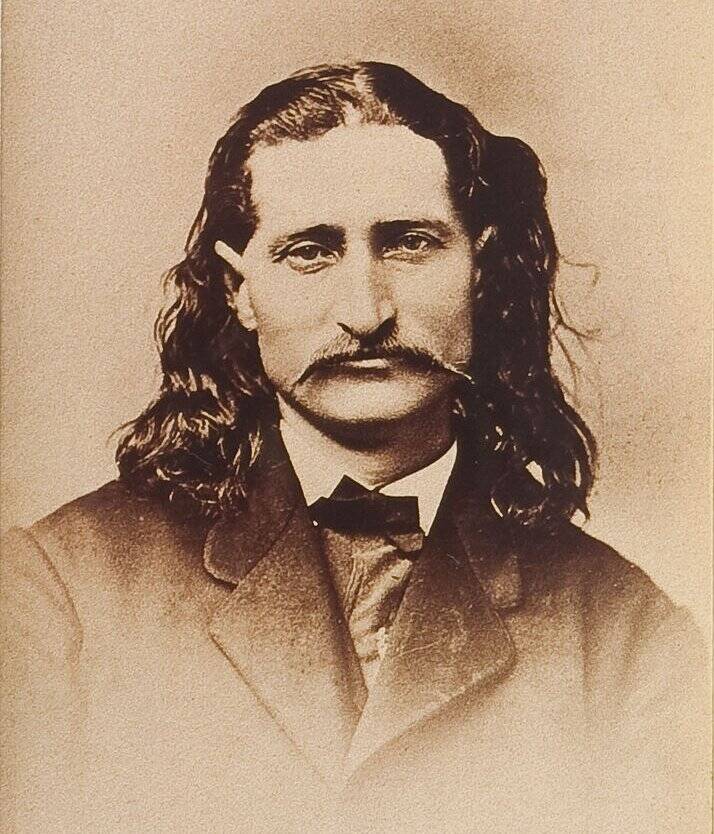
Public DomainJames Butler Hickok, otherwise known as Wild Bill.
Wild Bill Hickok’s death during a poker game was a fitting end for a man whose life was a whirlwind of gunfights and gambling. But it came as a surprise — even to him.
By 1876, Hickok had made his way to Deadwood, South Dakota, a rowdy Wild West town where Hickok fit in well with the rambunctious population. Though nominally a lawman, Hickok had developed a vicious reputation as a gunslinger because of his series of infamous shootouts. Some even claim that Hickok had killed more than 100 men across the Wild West, although the true figure was more likely fewer than 10.
Hickok was known as a gambler too. And, on August 2, 1876, he made his way to Nuttal & Mann’s Saloon, a Deadwood haunt where he was well known, to play few hands of poker. Hickok uncharacteristically sat with his back facing the door and didn’t notice when a man named Jack McCall, who’d only recently arrived in Deadwood, walked in the door.
More focused on the hand of poker he’d just lost, Hickok exclaimed: “The old duffer. He broke me on the hand” as McCall snuck up behind him. The 39-year-old Wild West legend didn’t see McCall — or the gun in McCall’s hand. Instead, Wild Bill Hickok died instantly when McCall opened fire, slumping across the poker table holding what is now known as a Dead Man’s Hand: two black aces, two eights, and a fifth card.
This is the story of Wild Bill Hickok’s death, from the bloody scene in Nuttal & Mann’s Saloon to Jack McCall’s murderous motives.
How A Boy From Illinois Became A Wild West Legend
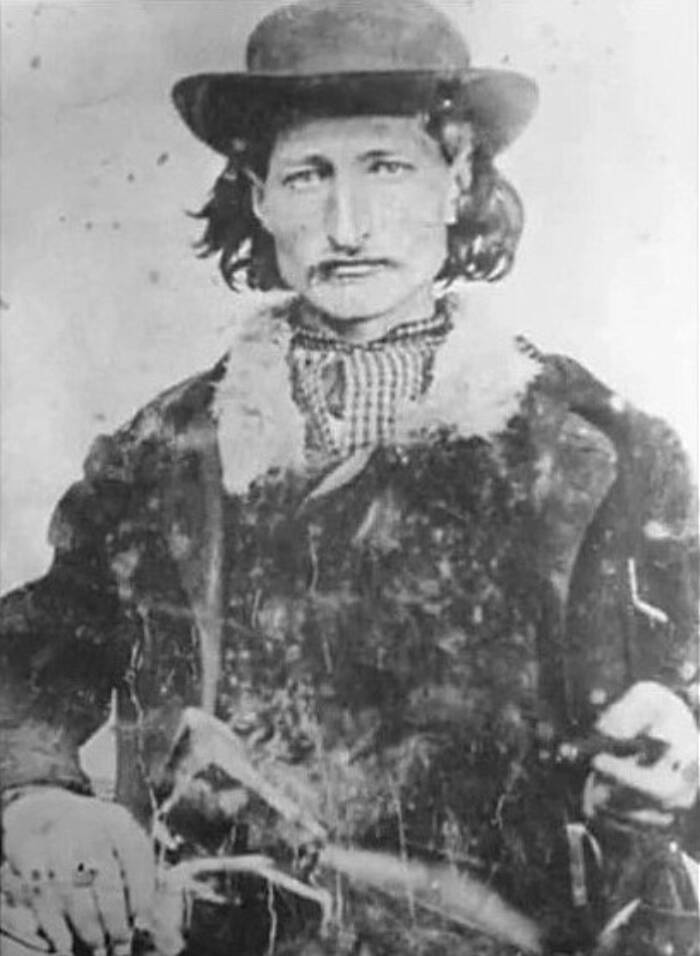
Public DomainWild Bill Hickok in the 1860s, during his pre-gunslinging days.
James Butler Hickok was born on May 27, 1837, in Homer, Illinois. His parents were abolitionists who operated a stop on the Underground Railroad, a risky business that necessitated skill with a gun. Hickok thus developed an early interest in shooting, and became an expert marksman at a young age.
Soon after Hickok’s father died in 1852, the teenager decided to seek out a life of adventure and excitement. He made his way to Kansas — then a hotbed of free state and slave state tensions — and joined up with the Jayhawkers, a free-state, anti-slavery guerilla fighter group. Hickok worked as a bodyguard and, around the same time, befriended a younger boy named William Cody who would one day be known as “Buffalo Bill.”
His reputation in the Wild West developed further on July 12, 1861. Then, Hickok was working at the Rock Creek Pony Express station in Nebraska — he was taking it relatively easy after sustaining serious injuries in a bear attack — when a man named David McCanles walked in the door with a posse. McCanles, who had recently had sold the station, had returned to demand back payments. When he became threatening, either Hickok or his boss, station chief Horace Wellman, opened fire and killed him.
McCanles’ death, and the deaths of others in his posse, marked the start of Hickok’s Wild West legend. In the aftermath, Hickok enlisted in the Union Army during the Civil War and soon became known as “Wild Bill Hickok.”
In the years that followed, Wild Bill Hickok’s reputation only grew. Though nominally a lawman, Hickok was entangled in a number of other infamous shootouts, including one in which he accidently shot his deputy (something that haunted Hickok for the rest of his life).
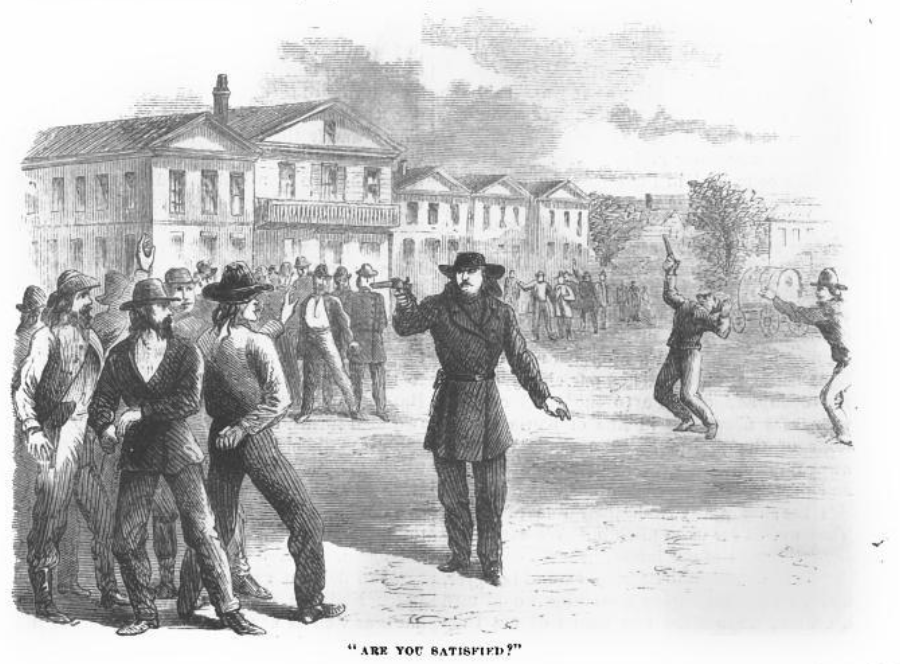
Public DomainA depiction of one of Wild Bill Hickok’s infamous duels, the “Hickok–Tutt shootout,” as depicted in an 1867 illustration in Harper’s magazine.
After further building his legend as a performer in Buffalo Bill Cody’s Wild West Show, Hickok made his way to South Dakota and arrived to the lawless town of Deadwood in early 1876. Though he fit in well with the rough-and-tumble populace, which included other Wild West icons like Calamity Jane, Deadwood would be Hickok’s final stop. Wild Bill Hickok’s death occurred in August 1876, when he was shot in the back of the head during a poker game.
Wild Bill Hickok’s Death During A Poker Game In Deadwood, South Dakota
The dominoes that led to Wild Bill Hickok’s death began on August 1, 1876, at Deadwood’s Nuttal & Mann’s Saloon. That day, a recent arrival to Deadwood named Jack McCall was hanging out at the saloon, getting progressively more drunk. According to Legends of America, he watched Hickok play poker and, when a space opened up, joined the game.
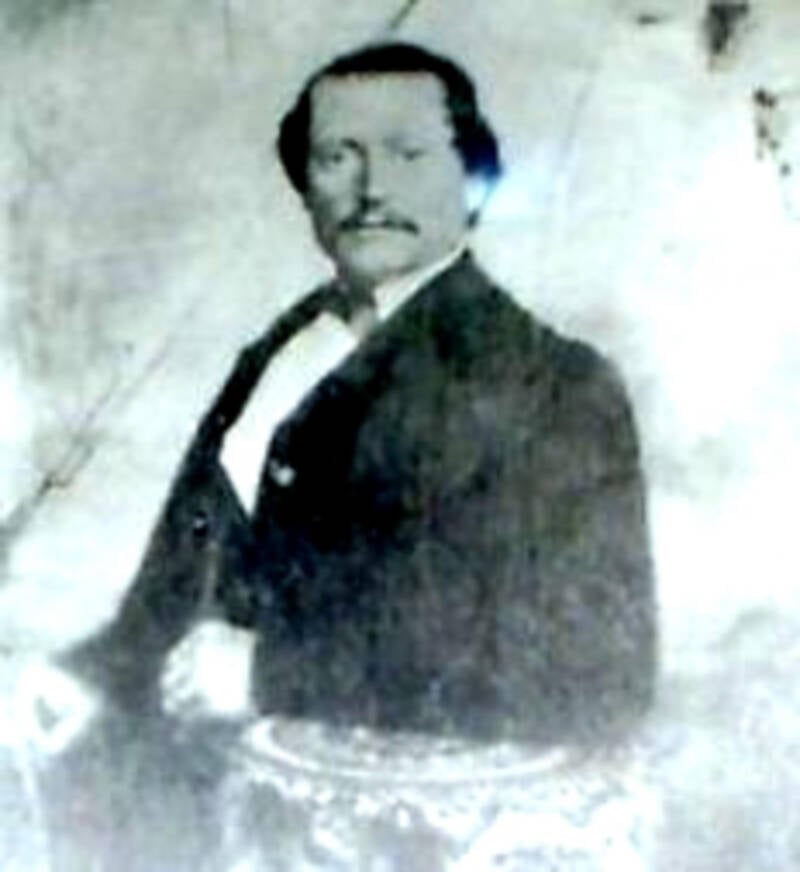
Public DomainWild Bill Hickok died after being shot in the head by Jack McCall, seen here.
Severely inebriated, McCall couldn’t keep up with Hickok. Not only did McCall lose all his money, but he suffered a blow to his dignity when Hickok handed him some cash, told him to get something to eat, and advised him not to play again until he could cover his debts. Seething and insulted, Jack McCall resolved to get revenge on Hickok as soon as possible.
The next day, he returned to Nuttal & Mann’s Saloon. Hickok was already there, uncharacteristically sitting with his back to the saloon doors as he played a game of poker. He didn’t notice McCall; rather, Hickok’s attention was focused on the game at hand, which he’d just lost. “The old duffer,” Hickok sighed, speaking his last words, “He broke me on the hand.”
Then, Jack McCall raised his .45 caliber revolver, shouted “Damn you, take that!” and fired. Wild Bill Hickok died immediately — McCall had shot him in the back of the head at point blank range — but others in the saloon got lucky. Though McCall tried to fire his gun again, his remaining cartridges turned out to be duds. Instead, he fled.
In the confusion that followed, someone took note of Hickok’s last poker hand — two black aces, two eights, and a fifth card. Today, this is known as the “Dead Man’s Hand.”
The Aftermath Of Wild Bill Hickok’s Death
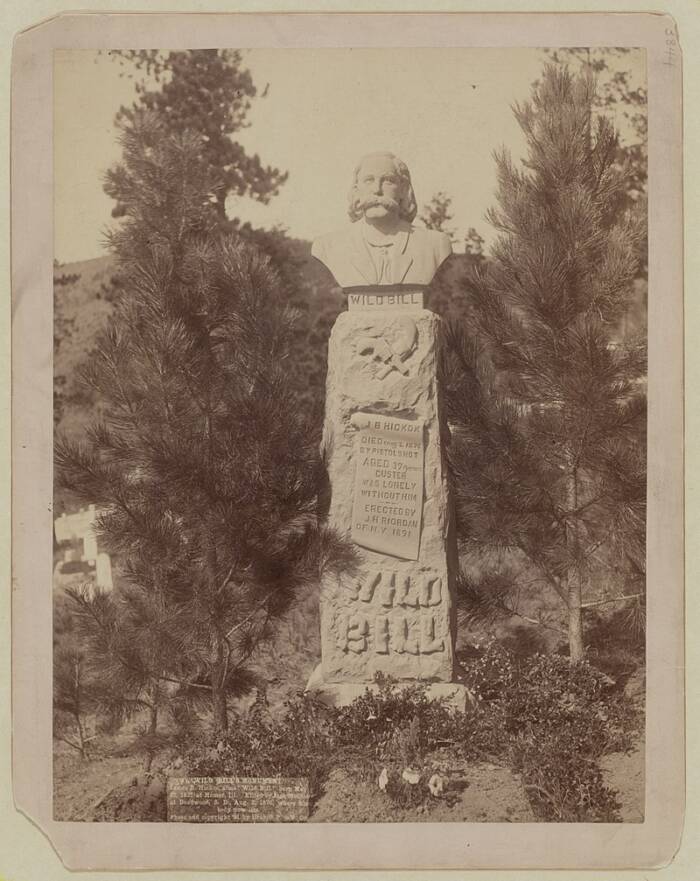
Public DomainA monument to Wild Bill in Deadwood, South Dakota.
Shortly after Wild Bill Hickok’s death, Jack McCall was found hiding in a butcher’s shop. The next day, he stood trial before a miner’s court and claimed that he’d killed Hickok because Hickok had killed his brother back in Abilene, Kansas. Given Hickok’s gunslinging reputation, and McCall’s emotional vow that he’d kill Hickok over again if he could, the miner’s court found that he was not guilty. McCall was allowed to walk free.
However, McCall continued to brag about Wild Bill Hickok’s death to anyone who would listen. What’s more, it soon came out that he didn’t even have a brother. And because his verdict in Deadwood had no legal basis — Deadwood was in Indian Territory — a U.S. Deputy Marshal in Wyoming was able to arrest McCall that August.
This time, Jack McCall was found guilty of Wild Bill Hickok’s death. On March 1, 1877, he was hanged.
Back in Deadwood, Hickok had been laid to rest by his close friend Charlie Utter, who paid for Hickok’s burial plot and wrote the epitaph for his tombstone. It reads:
Wild Bill B. Hickok
Killed by the assassin Jack McCall
Deadwood, Black Hills
August 2, 1876
Pard, we will meet again in the
Happy Hunting Grounds to part no more
Goodbye
Colorado Charlie, C. H. Utter
In the decades following Wild Bill Hickok’s death, tourists and spectators visited his gravesite, including Calamity Jane — who claimed to have been Hickok’s secret wife and lover.
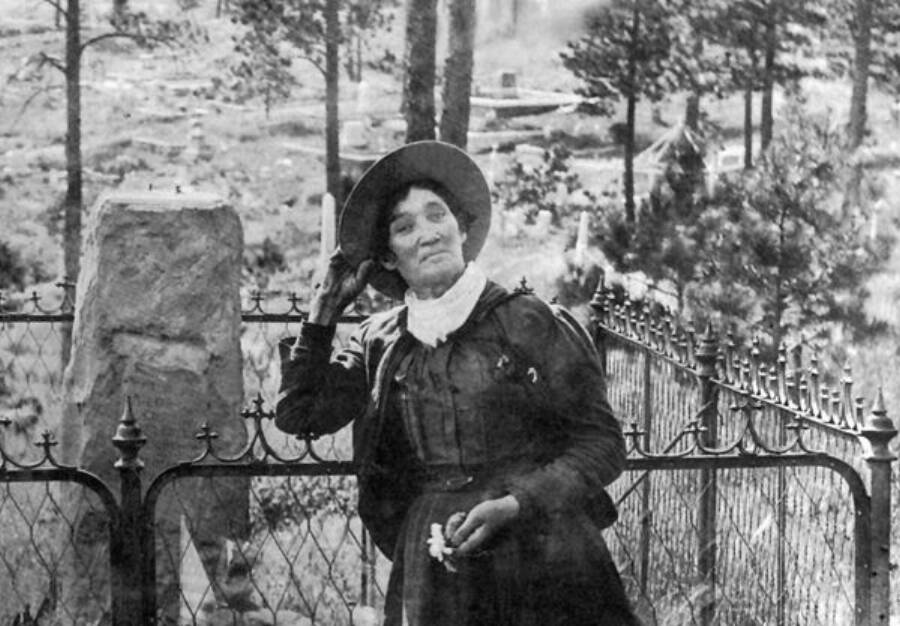
Science History Images / Alamy Stock PhotoAn older Calamity Jane at Hickok’s gravesite.
And though Hickok is long dead, his memory lives on. In 1979, Wild Bill Hickok was inducted as a member of the World Series of Poker’s Hall of Fame. In Deadwood, “Wild Bill Days” occurs every June to celebrate his life. And, of course, Wild Bill Hickok’s death is remembered every time someone draws a Dead Man’s Hand in poker.
Thus, while gone, Wild Bill Hickok is certainly not forgotten.
After reading about Wild Bill Hickok’s death, dive into the story of Billy the Kid’s death. Then, read about nine Wild West outlaws who wreaked havoc across the American Frontier.





